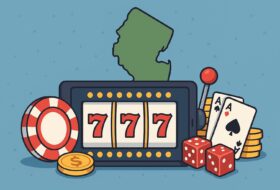
Counter-Strike Global Offensive (CS: GO), one of the world’s most popular video games, periodically comes under fire for the way its in-game purchases provide the basis for a form of unsafe, unregulated gambling known as skin gambling. At peak times, there can be over one million users playing CS:GO simultaneously. Now, with a sequel coming, skin gambling is one the rise once again.
Along with its fast-paced, competitive gameplay, the tradable cosmetic items known colloquially as “skins” are one of CS:GO’s main selling points. The transferrable ownership of those skins is what makes them usable for gambling purposes.
Illegal skin gambling has been a dark cloud hovering over CS: GO since shortly after the introduction of skins in 2013. Despite a crackdown by the game’s developer Valve in 2016, skin gambling has begun rising in popularity again.
The game’s sequel, Counter-Strike 2 (CS2), is scheduled for release this summer. Many hoped it would eliminate the problem. Unfortunately, that doesn’t seem to be the case. Rising prices for the digital items in the wake of the launch announcement may actually be making the problem worse.
However, Valve has chosen to be proactive this time, updating its online conduct rules to forbid gambling on its game distribution platform, Steam.
Skin Gambling Accessible to Underage Users
One of the most harmful aspects of skin gambling is that it’s easy for those under the legal gambling age to make a wager. The minimum age to create a Steam account is just 13. CS:GO has an 18+ age rating, but this is easy to circumvent.
Skin gambling casinos often pay lip service to having an age restriction but don’t conduct any checks. Typically, users just have to click a button to claim they’re of legal age. By contrast, regulated US online casinos have strict identity verification procedures to prevent underage gambling.
Many CS:GO players say that skins were their entry point to gambling, with some later developing problems as a result. A 2017 British Gambling Commission report found that 11% of 11-to-16-year-old kids in the UK had engaged in skin gambling.
Skins are virtual goods, most often weapons, that players can buy or earn, whose in-game function is purely cosmetic. Some are rarer than others, and in games where skins are transferrable, the rarest skins can have a high market value in real-world currency.
The fastest way to get skins is through in-game purchases for real money. Players can also get skins for free through random drops after games.
Due to the game’s open application programming interface (API), there are third-party websites where users can purchase skins for other users. From there, it wasn’t a big leap for websites to pop up allowing users to participate in events to win them.
Some skin gambling sites allow users to bet their skins directly. Others exchange them for virtual currency, which the user can then gamble with.
The 2016 Valve Crackdown and New Rules for 2023
The introduction of skins to CS:GO in 2013 led almost immediately to the appearance of this sort of gray market activity. Within three years, the backlash forced Valve to step in.
In 2016, the company issued cease-and-desist letters to skin gambling sites. It also implemented a time limit and cap on trading to reduce volume.
Some sites did close down, but many didn’t. The issue slowly started to fade from the mainstream public’s awareness. However, multiple parents sued Valve over the issue, and that battle took years to work through the courts. Finally, in 2022, Valve emerged victorious as the last of the claims ended in dismissal.
On May 10, 2023, Valve announced new online conduct rules for Steam. One caught everyone’s eye in light of the upcoming release of CS2.
It states that users cannot engage in “commercial activities,” which include:
Posting advertisements; running contests; gambling; buying or selling Steam accounts; selling content, gift cards, or other items; and begging.
However, it remains to be seen how well Valve can police the issue. The tone on CS:GO internet forums suggests that most users expect that not much will change.
CS2 Announcement Sparked Soaring Skin Prices
In March 2023, Valve announced the long-awaited arrival of CS2. Lucky participants (determined by status, number of skins, and more) were chosen to play the test run. Everyone else will have to wait until CS2 goes live this summer for everyone else.
Most of the buzz surrounding the sequel concerns how the gameplay will change. For skin bettors and traders, however, the most significant announcement was that all skins will transfer from CS:GO to CS2. That sparked renewed interest in skin trading and gambling. One thing holding skin prices back had been the worry that they’d lose value if CS:GO became obsolete.
With the announcement of skin transferability, values skyrocketed overnight. April 2023 saw multiple new records for the highest-valued transaction, including some six-figure prices.
Skin gambling casinos have naturally seized the opportunity. Advertising of skin gambling has increased, enticing players to risk their newly-valuable skins in pursuit of even larger winnings.
Searching on YouTube or Twitch, one can find numerous videos or streams of influencers playing at illegal skin gambling sites. Though Twitch has officially changed its policies to fight crypto casinos, neither site seems to have done much to address the exposure of minors to skin betting.
Just days before the CS: GO Major in Paris (the biggest competition for CS: GO), one of the participating teams announced a controversial deal with a skin gambling company. G2 Esports has a sponsorship agreement with the gambling site CSGORoll featuring player Ilya “moNESY” Osipov. Perhaps the most shocking aspect of the deal is that Osipov had just turned 18 the day before it was announced, and many of his fans are minors.
Neither Valve nor the event organizers have done anything to address the promotion.





